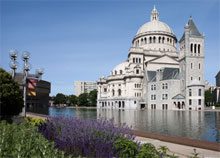 Monday, June 8, marked the annual meeting of the Church of Christ, Scientist, based in Boston. The meeting was held online. The church is one of many faith groups that has worked tirelessly over the past several months to help congregations move to a virtual space, in compliance with local guidelines and recommendations.
Monday, June 8, marked the annual meeting of the Church of Christ, Scientist, based in Boston. The meeting was held online. The church is one of many faith groups that has worked tirelessly over the past several months to help congregations move to a virtual space, in compliance with local guidelines and recommendations.
The annual meeting was an occasion for members to come together and consider what it means to be a church in a time of crisis — to go above and beyond what’s being asked by authorities, and really serve.
“What real love does is reduce fear,” said Robin Hoagland, of the church’s five-member board of directors, “and that is the love that is most needed right now.”
The question applies to needs from the current economic and public health crisis as well as global concerns about civil rights. The Christian Science Monitor, mentioned in the meeting, is one way the church aims to show its commitment to addressing such issues. The newspaper was founded in 1908 with the motto, “to injure no man but bless all mankind.” It has covered issues relating to injustice and race since its earliest days. Pandemic coverage in recent months has been offered without a paywall.
Church officials and members’ comments during the meeting highlighted the connection between worshipping God and caring for one’s neighbors — a core teaching of Jesus, which Christians embrace.
“To the degree that we love God with all our heart, soul, and mind — to that degree will our hearts and hands be moved by Christ to meet the needs of our brothers and sisters,” board member Keith Wommack conveyed.
A member from Germany who has been organizing humanitarian aid for the UN said, “When you are faced with global humanitarian needs, you can do a lot of things that are not meeting the needs of the people, or you face obstacles.” Prayer “brings solutions to mind. . . . because prayer is powerful. It has an impact.”
Comments also affirmed the church’s commitment to spiritual healing, which endeavors to see the image of God in everyone. “Great charity and humility is necessary in this work of healing,” wrote church founder Mary Baker Eddy. “The loving patience of Jesus we must strive to emulate.” Healing can’t be approached dogmatically, Christian Scientists emphasize. It is about giving gratitude to God, who is love, and learning to acknowledge more of this saving presence.
A member from Peru shared how God’s love healed his grief after his son died in the hospital from a car accident. During this same time he was healed of chronic pain in his knees and spine. The encouragement of the local church was instrumental, he said, and he joined soon after.
The church’s clerk welcomed new members from over 30 countries, — from Angola, Argentina, Australia, Austria, to the UK, US, Uruguay and Zimbabwe. Members also welcomed a new president, Anne-Françoise Bouffé, of Paris, France.
The meeting concluded with a video compilation of hundreds of members singing a hymn in five languages. Meeting participants were invited to join in live from home, including those who tuned in from South Carolina.
Kevin Ness is the Manager of Christian Science Committees on Publication for The First Church of Christ, Scientist





